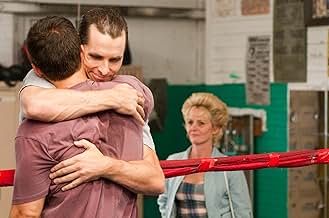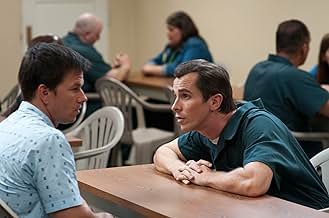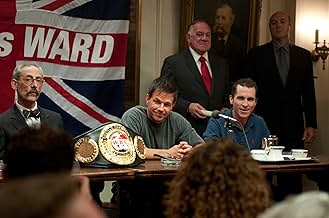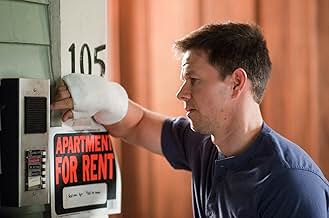Basé sur l'histoire de Micky Ward, ce film présente un jeune boxeur qui tente d'échapper à l'ombre de son frère plus âgé, plus célèbre mais perturbé, et trouve sa propre chance de devenir un... Tout lireBasé sur l'histoire de Micky Ward, ce film présente un jeune boxeur qui tente d'échapper à l'ombre de son frère plus âgé, plus célèbre mais perturbé, et trouve sa propre chance de devenir un grand boxeur.Basé sur l'histoire de Micky Ward, ce film présente un jeune boxeur qui tente d'échapper à l'ombre de son frère plus âgé, plus célèbre mais perturbé, et trouve sa propre chance de devenir un grand boxeur.
- A remporté 2 oscars
- 74 victoires et 123 nominations au total
- Phyllis 'Beaver' Eklund
- (as Kate O'Brien)
Histoire
Le saviez-vous
- AnecdotesChristian Bale got involved when Mark Wahlberg asked him to take part in the movie. Wahlberg and Bale knew each other through their daughters, who attended the same elementary school.
- GaffesMicky Ward is introduced before a fight as having 20 KOs. He defeats an opponent by KO, and then is introduced for a later fight as having only 20 KOs instead of 21.
- Citations
Dickie Eklund: Are you like me? Huh? Was this good enough to fight Sugar Ray? Never had to win, did I? You gotta do more in there. You gotta win a title. For you, for me, for Lowell. This is your time, all right? You take it. I had my time and I blew it. You don't have to. All right? You fuckin' get out there, and use all the shit that you've been through, all that fuckin' hell, all the shit we've gone through over the fuckin' years, and you put it in that ring right now. This is yours. This is fuckin' yours.
- Générique farfeluThe real Micky Ward and Dicky Eklund are shown during the end credits.
- Bandes originalesHow You Like Me Now?
Written by Kelvin Swaby, Dan Taylor, Spencer Page, Chris Ellul and Arlester Christian
Performed by The Heavy
Courtesy of Counter Records
David O. Russell brings a needed dose of realism to the boxing genre, downplaying the underdog nature of Micky's true story and focusing on the relationships that push him through and hold him back all throughout his journey toward the welterweight title. Much of the time, in fact, the story feels equally Micky's and his brother's. Dickie Eklund (Christian Bale), as beat over our heads early in the film, went ten rounds with Sugar Ray Leonard and knocked him down, becoming the pride of small working-class town Lowell, Mass. — which as one might imagine, wasn't hard.
But Dickie, an off-kilter, fun-loving yet irresponsible guy (a transformative performance from Bale to say the least), spends the time he's not training Micky in crack houses. In fact, he's completely oblivious to the fact that HBO is following him around for their documentary on crack abuse, not one about his "comeback." It's clear that his behavior is keeping Micky, whose had a string of bad losses of late, down. After an embarrassing fight in which Micky was mismatched, Micky suddenly finds himself wondering whether he should keep his boxing career and family separate.
The idea of it irritates Micky's mother Alice, played by Melissa Leo, who impressively embodies every controlling mother. Alice sits in her house most days and smokes cigarettes while her seven grown daughters pathetically vie for her attention. Leo keeps Alice from being an aggravating total monster, providing a more complete picture of a mother whose blurred the line between business and family.
Amy Adams also excels in her supporting role, a bartender and college dropout, but one who — like the audience — sees how Micky's family has kept him back and as his girlfriend pushes him toward the right path. Interestingly, as she grows more invested in Micky's career, the script divides her from the audience, which gives her performance more weight.
Russell's characters have a harsh reality to them, much like the Boston-based characters in Ben Affleck's films "Gone Baby Gone" and "The Town." In addition to looks, clothes and mannerisms, Russell chooses a more hand-held documentary feel for the film like Darren Aronofsky's "The Wrestler" and even opts to film parts of the boxing sequences with lenses like the ones used in the late '90s to give the feel of watching a live broadcast.
The fights, though effective, remain secondary to the other "fighting." Watching Dickie spiral downward and come back up again, Alice have trouble letting go and Micky struggle to speak up for himself and recognize what he truly needs serves as the more compelling conflict. All together, they give "The Fighter" the best ensemble cast of 2010. And like all great boxing films, all these tensions blow in and out make their way symbolically into the boxing ring for that final fight. As Dickie urges on his brother in the waning rounds of the championship fight, he captures it perfectly when he says "everything that's happened, take that out there with you."
The emotional moments of "The Fighter" do lack a real knockout and many intimate moments are tempered with humor in awkward but not scene-ruining ways, but rather than be a heavyweight drama that rides the underdog story for two hours, "The Fighter" opts to be something a bit more natural by fixing on the right things: the people and the personal relationships that hurt or harm us, are all essential to our success.
~Steven C
Visit my site at http://moviemusereviews.com
- Movie_Muse_Reviews
- 26 déc. 2010
- Lien permanent
Meilleurs choix
Détails
- Date de sortie
- Pays d’origine
- Site officiel
- Langue
- Aussi connu sous le nom de
- The Fighter
- Lieux de tournage
- sociétés de production
- Consultez plus de crédits d'entreprise sur IMDbPro
Box-office
- Budget
- 25 000 000 $ US (estimation)
- Brut – États-Unis et Canada
- 93 617 009 $ US
- Fin de semaine d'ouverture – États-Unis et Canada
- 300 010 $ US
- 12 déc. 2010
- Brut – à l'échelle mondiale
- 129 190 869 $ US
- Durée1 heure 56 minutes
- Couleur
- Mixage
- Rapport de forme
- 2.35 : 1
Contribuer à cette page








































